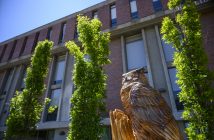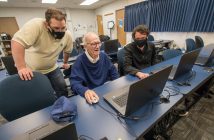Imagine as a senior in college you research heady stuff, like determining how manipulation of specific proteins in neuronal support cells impacts their function.Well that’s what Westfield State University biology major James Scripter ’16 got to study when he collaborated with Robin White,
Ph.D., assistant professor of biology, in a spin-off of her doctoral work. Dr. White describes the research as “a very technically
complex project.”
“James’s amazing laboratory skills have helped him be very successful. In addition, he is incredibly knowledgeable about biology and asks great questions,” she says.
Dr. White’s research papers helped Scripter better understand the concept; he admits it took him quite a while to fully grasp its
importance, but then he was hooked. The research is complicated to lay out simply for lay people, but key in the work were studies of cellular matter, such as neurites, neurons, and astrocytes.
“The one thing that interested me the most is the fact that we
were able to cause the neurites of neurons to grow longer by just adding a piece of DNA. That’s just unbelievable,” he says.
From Scripter’s results, he found a statistically significant increase in neurite length. That means in cases like spinal cord
injuries, or neuronal diseases, the length of neurites help in the healing process to reclaim those previous connections.
Scripter presented his findings at the 22nd annual Massachusetts Statewide Undergraduate Research Conference at the University of Massachusetts in April and the Westfield State Research Conference in May.
“It is incredibly important for students to present their work at conferences. Oftentimes, we focus on the lab work, but being able to present and share findings is an important part of the process,” Dr. White says. “The students get the opportunity to improve their presentation skills and learn about other areas of research.”




